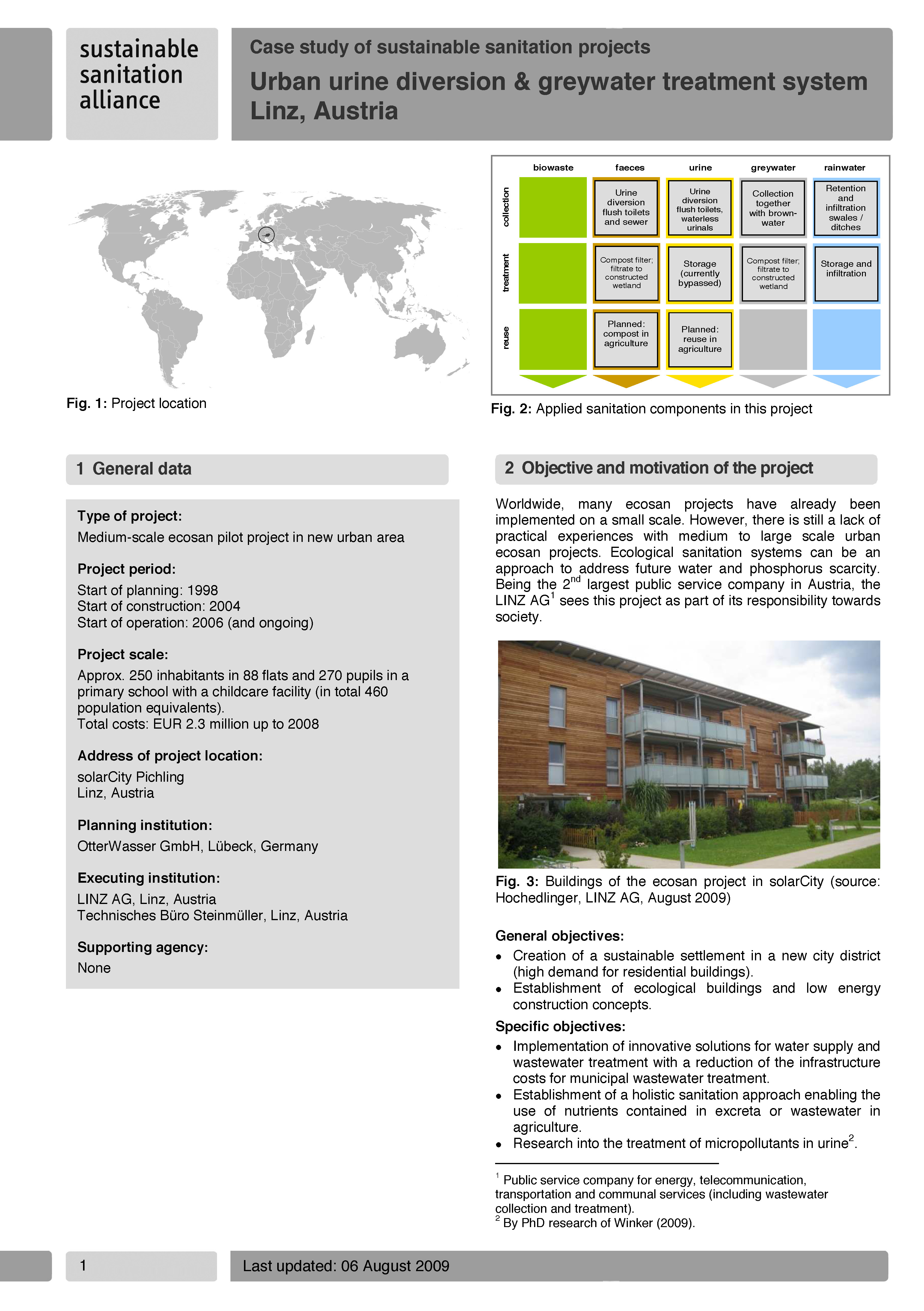Urban urine diversion and greywater treatment system Linz, Austria - Case study of sustainable sanitation projects
Oldenburg, M., Werner, C., Schlick, J., Klingel, F. (2009)

Published in: 2009
Publisher:
Sustainable Sanitation Alliance (SuSanA)
Author:
Oldenburg, M., Werner, C., Schlick, J., Klingel, F.
Uploaded by:
SuSanA secretariat
Partner profile:
common upload
14776 Views
429 Downloads
Location of library entry
Content - Summary
This case study discusses a medium-scale pilot project in a new urban area in Linz, Austria. The project serves 250 inhabitants in 88 flats and 270 school pupils. It was developed with participation of the municipal authorities, 12 housing companies and READ (Renewable Energies in Architecture and Design) as the main architectural initiator. In 2008, the ecosan project solarCity Linz received the Project Innovation Award as regional winner for Europe in the category „Small Projects“ by the International Water Association.
General objectives were the creation of a sustainable settlement in a new city district (high demand for residential buildings) and the establishment of ecological buildings and low energy construction concepts. Among specific objectives was the implementation of innovative solutions for water supply and wastewater treatment with a reduction of the infrastructure costs for municipal wastewater treatment. Also, the aim was to establish a holistic sanitation approach enabling the use of nutrients contained in excreta or wastewater in agriculture and to research treatment of micropollutants in urine.
This project manages the wastewater of approx. 460 population equivalents by means of urine separation, compost filters and constructed wetlands. The construction of all parts (separation toilets, urine collection pipes, etc.) and the information for the users were carried out by the non-profit residential cooperatives.
The reuse of urine is not yet carried out because the Upper Austrian legislation prohibits its application in agriculture. At the moment the composting process of the compost filter material is not functional due to optimisation works. In the future, nutrient recycling (through use of urine, compost and reeds from the constructed wetlands) and on-site infiltration of the treated brownwater and greywater shall be realised in cooperation with research partners. Rainwater is infiltrated on-site through infiltration ditches. Besides the ecological sanitation concept solar energy and energy-saving technologies are also implemented in solarCity.
The ecosan technologies applied in this project are not yet fully mature and functional. There is a need for optimisation of the NoMix toilet design. The slightly increased demand for cleaning is acceptable. But for young children, e.g. at primary schools, the Roediger toilets are not suitable. The waterless urinals are trouble-free. The project at the school has had significant problems with the urine separation flush toilets for small children who find it difficult to sit back far enough for defecation. Public relations work, i.e. user information, is extremely crucial for the acceptance of innovative sanitation systems and the users’ willingness to cooperate. The general acceptance of the innovative sanitation concept is good, despite the challenges that are brought about by the urine diversion flush toilets. Valuable experience with the medium-scale application of compost filters could be gained in this project. One problem is that the filter units were undersized (the permeability of the filter bags turned out to be lower than expected). Moreover, it became evident that it is important to include the local authorities from the beginning as it avoids many problems in the long run.
Bibliographic information
Oldenburg, M., Werner, C., Schlick, J., Klingel, F. (2009). Urban urine diversion and greywater treatment system Linz, Austria - Case study of sustainable sanitation projects. Sustainable Sanitation Alliance (SuSanA)
Filter tags
Case studies in SuSanA template Constructed wetlands English Europe & Central Asia Urban (entire city)















